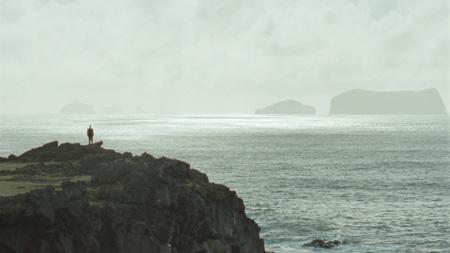Rúnar Rúnarsson was just in his teens when he decided to go for a career as a film director. At age 17, he and a friend made the short film "Toilet Kultur", a single continuous shot of absurd events witnessed from the depths of a public lavatory bowl.
"In a lot of ways Hannes represents an outdated model of masculinity that today seems almost archaic. He is from a time when there was no such thing as the 'sensitive male'."
The film was accepted to the Nordisk Panorama festival and the young Icelander was stoked. Soon, he was applying to the National Film School of Denmark. What ultimately got Rúnarsson into the Film School in Copenhagen was "The Last Farm" (2004), his short film about a 83-year-old Icelandic farmer whose wife dies just a few days before they were supposed to leave their farm and go into a retirement home. Unable to deal with the reality of his loss, he keeps her death a secret. The film, which was nominated for an Oscar, struck the singular note that has since become a Rúnarsson hallmark: his rare ability to depict people at vulnerable crossroads in life.
Other fateful junctures are found in Rúnarsson's two awardwinning student films, "2 Birds" (2008) and his graduation film "Anna" (2009), which in separate ways describe the necessary but tough losses of innocence in childhood and youth."2 Birds" was nominated for a host of awards, including a Palme d'Or at Cannes in 2008.
A RETIRING JANITOR
Like "The Last Farm", "Volcano" tells the story of an elderly man. Hannes, who has worked his whole life as a janitor at a public school, is now facing retirement and he doesn't like what he sees. Why would a young director choose to make his first feature about a retiring janitor?
"As I see it, there's not much distance thematically between my short films and 'Volcano'. Each in its own way is about crossroads. One of the things that interest me most is how people navigate the transition from one stage in life to the next, whether from childhood to adolescence or adolescence to adulthood. Or, as in this film, someone is heading into the final phase of life. Someone who, as long as he can remember, has been defined by his job and now has to come to terms with a whole other set of circumstances," Rúnarsson says.
"'Volcano' is a love story with conflicts most people will recognise. In every one of my characters – it doesn't matter if it's an old man or a young girl – I can see traits of myself."
In "Volcano", it is not just Hannes' approaching retirement that turns his life upside down. An unexpected event forces him to step up and take charge, even as no one in his immediate circle has much faith in him.
"Volcano". Photo: Sophia Olsson
EMOTIONAL OUTBURST
Are you looking to portray a particular image of masculinity in Hannes?
"In a lot of ways Hannes represents an outdated model of masculinity that today seems almost archaic. He is from a time when there was no such thing as the 'sensitive male', which creates friction with the new generation that his son and daughter belong to," Rúnarsson says.
The generation gap is evident in things like Hannes' inability to show his feelings around people, which can make him seem like a cold, hard man.
"On this point he's different from today's norm. Today, it seems like any declaration of love is supposed to have as large an audience as possible. In the film, though, we quickly see that Hannes is anything but emotionally crippled. He just doesn't like to share his private love with others, "Rúnarsson says.
"This generation gap causes a lot of communication conflicts between children and parents. Hannes' son, who's divorced, can't see why his mother should put up with the tone Hannes uses around her. But, of course, they are shaped by such different traditions that it's impossible to compare their norms, much less determine whose are best."
Choosing to shoot in Rúnarsson's native Iceland was no coincidence. The volcano of the title is obviously hard to translate to a Danish context. It serves both a specific and a metaphoric purpose.
"'Volcano' is set on the outskirts of an Icelandic town where everyone was evacuated because of a volcanic eruption 38 years before. Hannes and his family were among the evacuees, but they never returned once the danger passed, which gave the family a certain rootlessness, "Rúnarsson says.
Metaphorically, the volcanic element is also expressed as the emotional outburst building up steam under Hannes' hard shell.
"Hannes' inner life is so chaotic, probably because he never learned to be in touch with it the same way we do today. So, when his world collapses, certain repressed emotions come gushing out that he finds himself unable to articulate. And that's a formidable thing".
"Volcano" is produced with support from the talent fund New Danish Screen.

